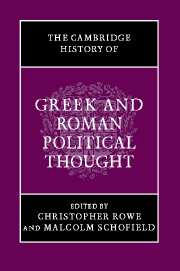Book contents
- Frontmatter
- Introduction
- PART I ARCHAIC AND CLASSICAL GREECE
- 1 Greek political thought: the historical context
- THE BEGINNINGS
- 2 Poets, lawgivers, and the beginnings of political reflection in archaic Greece
- 3 Greek drama and political theory
- 4 Herodotus, Thucydides and the sophists
- 5 Democritus
- 6 The Orators
- 7 Xenophon and Isocrates
- 8 Socrates and Plato: an introduction
- 9 Socrates
- 10 Approaching the Republic
- 11 The Politicus and other dialogues
- 12 The Laws
- 13 Plato and practical politics
- 14 Cleitophon and Minos
- ARISTOTLE
- PART II THE HELLENISTIC AND ROMAN WORLDS
- Epilogue
- Bibliographies
- Index
- Map 1. Greece in the fifth century bc"
- References
9 - Socrates
from THE BEGINNINGS
Published online by Cambridge University Press: 28 March 2008
- Frontmatter
- Introduction
- PART I ARCHAIC AND CLASSICAL GREECE
- 1 Greek political thought: the historical context
- THE BEGINNINGS
- 2 Poets, lawgivers, and the beginnings of political reflection in archaic Greece
- 3 Greek drama and political theory
- 4 Herodotus, Thucydides and the sophists
- 5 Democritus
- 6 The Orators
- 7 Xenophon and Isocrates
- 8 Socrates and Plato: an introduction
- 9 Socrates
- 10 Approaching the Republic
- 11 The Politicus and other dialogues
- 12 The Laws
- 13 Plato and practical politics
- 14 Cleitophon and Minos
- ARISTOTLE
- PART II THE HELLENISTIC AND ROMAN WORLDS
- Epilogue
- Bibliographies
- Index
- Map 1. Greece in the fifth century bc"
- References
Summary
There is in Plato’s early dialogues (here labelled ‘Socratic’) a certain ‘intellectualism’ that is quite foreign to the middle and later dialogues (here labelled ‘mature Platonic’ dialogues). Indeed, that intellectualism, with its implication that only philosophical dialogue can improve one’s fellow citizens, is decisively rejected by Plato in the parts of the soul doctrine of the Republic. On that doctrine, it is essential to the improvement of citizens that their appetites and spiritedness be controlled, either by their reason or by the reason of the intellectual elite. This contrast between dialogue in ‘Socrates’ and control of one’s lower parts in ‘the mature Plato’ – one which even those most opposed to ‘developmentalism’ will be hard pressed to deny – is explored in section 1 below. But there are also striking continuities between ‘Socratic’ and ‘mature Platonic’ thought, of a sort sometimes missed by ‘developmentalists’. If for ‘Socrates’ what is required for an individual’s human goodness is that individual’s full intellectual grasp on the real human good, so for ‘the mature Plato’, such a grasp by those in the intellectual elite is quite as necessary for the goodness of all the citizens. These continuities (concerning attitudes to the good, the ideal, the sciences and practical politics) are explored in sections 2 and 3 and section 5 ad finem. Sections 4 and 5 explore these continuities and contrasts as they show up in the three most overtly political ‘Socratic’ dialogues: the Protagoras, the Apology and the Crito.
- Type
- Chapter
- Information
- The Cambridge History of Greek and Roman Political Thought , pp. 164 - 189Publisher: Cambridge University PressPrint publication year: 2000
References
- 11
- Cited by

